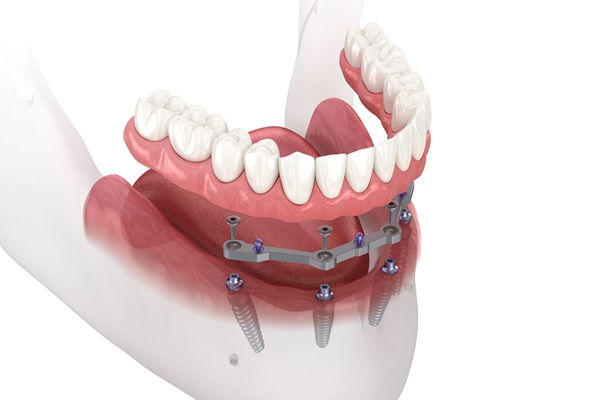Comparing Implant Supported Dentures With Traditional Dentures

Most of us know that dentures are an option if we lose our teeth, but there is also a more permanent solution called implant supported dentures. If you’re not familiar with this type of denture, that’s ok. Recent advancements in dental technology have led to where patients can receive implants combined with other dental applications to make for a more comfortable and form-fitting tooth loss solution. Not only are these types of dentures more secure, but they also make it possible to eat the foods you love without worrying about your dentures falling out or breaking them and having to get an emergency replacement.
Differences between traditional dentures and implant-supported dentures
To help you decide if implant-supported dentures are right for you, we’ll compare them with traditional benefits to show the benefits and risks patients need to consider. We know how important your smile is and that getting a proper solution can impact your self-esteem as well as your quality of life.
To help inform your decision, we will directly compare implants versus traditional dentures.
The resting position of the dentures
As most of us know, traditional dentures work by sitting on the gums and using the upper or lower jawbone for support. In almost all cases, this is achieved by placing denture adhesive on the dentures and then placing them in the mouth. Over time the adhesive wears off and must be reapplied to keep the dentures in, and the dentures must be removed and cleaned every so often.
Conversely, implant dentures are permanently attached to the gum, with implants acting as an anchor for the denture application. This means that the dentures are fused to the mouth and not designed to be removed. For patients used to traditional dentures, this makes it easier to eat and talk without worrying about dentures falling out or becoming loose. Additionally, it is not necessary to apply denture adhesive for the teeth to stay in.
Jawbone recession is a symptom of traditional dentures
When you lose your natural teeth and get dentures, your jawbone loses the attachment to the root system that once supported your natural teeth. Therefore, a person’s mouth may begin to droop or sag over time, resulting in an unnatural look. Jawbone density can recede to the point that corrective surgery is needed. This is not to mention that traditional dentures become less stable as the jawbone recedes.
Dental implants are inserted directly into the jawbone and work the same way as natural tooth roots, stimulating the jawbone and preventing jawbone recession, resulting in a more natural facial appearance. This also improves the health of your mouth and jaw as other dental issues can impact the amount of jawbone that a person has available such as advanced gum disease. In this way, implants benefit not just your smile but your overall oral health and quality of life.
Reach out to your dentist for more information
These are just a couple of the advantages of implant dentures over traditional dentures. Contact your dentist to learn more about the pros and cons and if you are a good candidate for this procedure. Learning more will help you make the most informed decision regarding your oral health.
Request an appointment here: https://www.valleyriverdental.com or call Valley River Dental at (828) 360-9114 for an appointment in our Murphy office.
Check out what others are saying about our dental services on Yelp: Implant Supported Dentures in Murphy, NC.
Related Posts
Tooth loss affects appearance and the ability to chew, speak, and smile with confidence. Fortunately, implant-supported dentures can replace multiple teeth with a natural look and feel. This advanced tooth replacement is also known for its durability, stability, and ability to prevent jawbone loss. A general dentist trained in implant dentistry can help patients understand…
Getting tooth implants is not the final phase of an implant restoration procedure. The stage is simple, but the recovery period can be uncomfortable. This part of the implant process is the time for the mouth heals and fuses to the implant post. The following guide covers what to expect during recovery and the steps…
Seeing an emergency dentist for tooth extraction is sometimes necessary when pain, damage, or infection develops suddenly. Tooth extractions are typically planned in advance, but urgent situations may require immediate dental care to relieve symptoms and prevent further complications. Knowing when to seek help from an emergency dentist ensures that patients receive prompt and effective…
A trip to the dentist every six months can go a long way toward protecting your oral health. General dentists can perform an oral exam, catching any oral health issues early on. They will also remove tartar buildup during a professional teeth cleaning to preserve the teeth and gums. Explore why you should schedule an…
